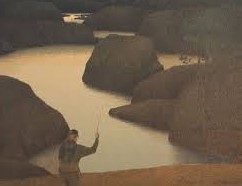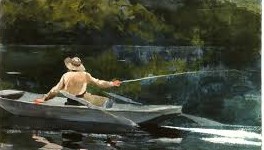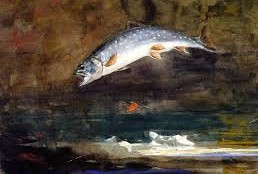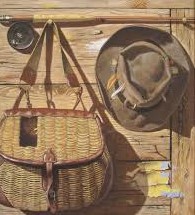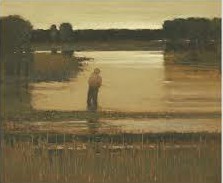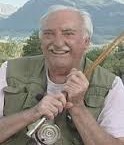There are few things that give one more pleasure on a winter’s night than a good work on fly fishing.
— Theodore Gordon writing in his last year for The Fishing Gazette
The anthology is a time-honoured form of outdoor sports and angling literature. Fireside or bedside collections have been common and popular since the early years of the last century. Most of the prominent outdoor magazines collected articles, essays and stories for publication as anthologies.
I found a handful of recent anthologies especially interesting, in addition to a worthwhile collection of reviews of must-have sporting and angling literature. Grab a cold beer and hit the cottage porch or sit by the crackling fireside on a long winter’s night with a favourite single-malt whisky, open the cover and cast your eye and mind on literature devoted to fishing generally and to fly fishing specifically.
CASTING QUIET WATERS
The first anthology is Casting Quiet Waters (Greystone Books). The volume is edited by Winnipeg-based writer Jake MacDonald, a novelist, memoirist and, like his old friend, the late Paul Quarrington, an avid fly angler. His piscatorial exploits are chronicled in three memoirs: Houseboat Chronicles: Notes from a Life in Shield Country (2002), With the Boys: Field Notes on Being a Guy (2005) and Grizzlyville: Adventures in Bear Country (2009).
MacDonald reveals his approach to selecting material in his introduction. ‘The concept arose in much the same way as one might decide to throw a dinner party — let’s invite the most respected writers at work in their fields to contribute a fishing story.’
He goes on to observe that ‘most of the authors decided to use the subject of fishing as an opportunity to pursue larger existential questions.’ Consequently, as is often the case with both fictional and non-fictional angling literature, ‘this collection turned out to be as much about life as fishing.’
Subtitled Reflections on Life and Fishing, the anthology features a dozen essays by a range of award-winning Canadian and American novelists, memoirists, journalists and sports writers, both men and women. Some, including Thomas McGuane, David Adams Richards, Annie Proulx, Charles Gaines and Ian Frazier, are prominent. Others, including David Carpenter, Charles Wilkins, Ian Pearson and Kenneth Kidd, are less familiar; however, they surrender no ground to the better-known writers in terms of literary merit.
Not all are dedicated anglers. While McGuane (Outside Chance and The Longest Silence) Richards (Lines on the Water), Frazier (The Fish’s Eye), Gaines (The Next Valley Over) and Wayne Curtis (Of Earthly Things and River Things) have written accomplished fishing books, others are occasional anglers. One writer, Marni Jackson, is not enamoured with angling at all, but found herself in Bimini on assignment for Saturday Night magazine. Not a bad gig.
MacDonald is no fly fishing snob. Not all the essays are devoted to this ‘elite’ form of fishing. When writers use fishing as a metaphor for life, the type of rod, reel and tackle is irrelevant.
Filleting the meat of existential reflection from the backbone of angling lore is difficult because the essays weave their themes masterfully through engaging narratives. For example, when McGuane compares catching tarpon to love, it seems silly — until you actually read the essay. ’Why is it incomparably thrilling?’ he asks in Trials of Tarpon. ‘It’s the contest joined, but it’s also a kind of euphoric admiration and — this is risky — it feels like love. You watch your fish and you are filled with admiration, transported by beauty. Isn’t that love? It was in high school!’
Not surprisingly, considering most anglers are men, a number of essays examine the relationship between father and son. In The Trophy Wall Wilkins uses fishing with worms and dilapidated gear at the family cottage to examine lack of communication between father and son. His father, a decorated Second World War vet, never opened up until he was on his death bed. Following his father’s example, Wilkins is no more communicative. When his son asks him what he thinks about while fishing, Wilkins replies: ‘stuff that (is) too difficult to explain.’
MacDonald’s uproarious essay Old Friends offers comic relief. It begins as a Laurel and Hardy Go Bonefishing escapade with fellow duffer Quarrington; it ends as a heartfelt meditation on mortality and friendship.
In More than Just a Sport, Curtis traces how seven generations ‘of river people,’ spanning 200 years, lived off the Miramichi River ‘as boat pilots, log drivers, stuntmen, cabin builders, outfitters, canoeists, guides and anglers.’ They didn’t fish for sport, but to fill the salt barrel for the table. Salmon fishing ‘remained a big part of our survival, our livelihood and our culture,’ he observes. His angling companions included two legends: Lee Wulff and Ted Williams.
In Reflections from the Pools, Richards writes a piscatorial letter to his son Anton chronicling the first salmon his brother John caught. Turns out Richards was prevented from witnessing the event because he was recovering from a couple of heart attacks. He excises the humiliation through the only way he knows how — putting it into words.
‘The woods and waterways of the Miramichi have kept me alive,’ he writes without hyperbole. Earlier he observes, ‘in some way all great fishing is a secretive act — an act between you and God. Don’t laugh at your old man, Anton, for when the fish takes, you will know I tell the truth.’
One of the essays strikes close to home. Kidd recalls getting introduced to fly fishing on the tailwater of the Grand River under the tutelage of the late Ian Colin James, the first professional fly fishing guide on the brown trout tailwater, who died recently when the big man’s big heart finally surrendered.
I will resist the temptation to quote from every essay. Instead, I’ll offer an observation from Pearson that applies not only to all the essays, but to angling generally: ‘Fly fishing (isn’t) about catching fish. . . . (it’s) about connecting, however briefly, with something larger than yourself.’
MacDonald makes a comparable point in his introduction when he quotes Dame Juliana Berners — the English nun credited somewhat apocryphally with writing the first treatise on fly fishing — declaring the purpose of both literature and fishing: ‘Ye shal not use this crafty sporte for the encreasing and sparing of your mony, but pryncypally for your solace, and the helth of your body, and specially of your soule.’
Casting on Quiet Waters is a fine collection, but I would have preferred MacDonald to confine himself to Canadian angling writing, which would have filled a large void in our national writing.
ASTREAM
Fly fishing literature has more in common with guitars than with violins. While violin-making reached its apex in the early 18th century when the Stradivari family was practising its artistry, contemporary guitar-makers design and construct better instruments than earlier artisans.
The same goes for fly fishing literature. Although there are numerous classic fly fishing texts spanning hundreds of years, most of the best literature on the sport was published in the last century. And much of it is American, with apologies to Jake MacDonald, Paul Quarrington and David Adams Richards, not to mention Roderick Haig-Brown (the dean of Canadian fly fishing writers), Greg Clark and Mark Kingwell, to name a few of the most prominent Canadian writers who have written exceptional books on the sport.
This fact is driven home with Astream, a new anthology of fly fishing literature edited by Robert Demott, an American English professor and fly fishing enthusiast, and published by Skyhorse Publishing.
In sheer numbers, fly fishing anthologies are as dense as a spinner fall at eventide. Look closely at the tables of contents, however, and you’ll discover a lot of repetition and redundancy. Evidently, there’s a lot of consensus with respect to the best that has been written and published about fly fishing.
Astream is a notable exception. Subtitled American Writing on Fly Fishing, it features 30 American writers, both male and female. They are serious writers who happen to be fly anglers and have written on the subject, as opposed to fly anglers who have written on the subject. Writers who earn their livelihood contributing to the rod-and-gun press are excluded. However, this doesn’t mean some of the writers haven’t graced the pages of outdoor sports publications. A few, such as Ted Leeson, Nick Lyons, Paul Schullery, W.D. Wetherell and Thomas McGuane, among others, have written outstanding books devoted to fly fishing.
The emphasis on literary authors (poets as well as prose writers) who fly fish defines the anthology. As a result, the bar is set extremely high in terms of quality of language. The other thing that sets Astream apart is that the individual pieces were either written specifically for the anthology or were previously published and extensively rewritten. In other words, you won’t find the essays in other publications.
The list of contributors is both diverse and impressive including Russell Chatham, Jim Harrison, Pam Houston, Sydney Lea, Robert Wrigley, Howard Frank Moser and Craig Nova, among others. Howell Raines contributes a foreword. You don’t have to be a student of contemporary American literature to recognize many of these authors. Michael Keaton is the lone actor in the bunch.
Demott’s introduction is worth the price of the book, which is a lovely companion to Afield, his anthology about American writers on bird dogs. Simply stated, you won’t find a better anthology of contemporary American fly fishing literature than Astream.
UPSTREAM & DOWNSTREAM
It’s anyone’s guess whether The Catskills and the Adirondacks would have become fly fishing meccas were it not for sportsmen — including writers and journalists — living and working in New York City. These legendary angling regions became the playground of sportsmen anxious to find refuge from urban mania on peaceful streams, rivers and lakes in the tranquil countryside.
The New York Times has dedicated a column to hunting and fishing since before the Second World War. Initially called Wood, Field and Stream, the column became Outdoors in the 1970s, perhaps reflecting the ‘transformation on both sporting and physical landscapes,’ speculates editor Stephen Saunter in his preface to the fine collection Upstream & Downstream (published by Harmony Books).
Subtitled The Best Fly Fishing & Angling Adventures from the New York Times, the volume assembles 70 columns covering the spectrum of angling from freshwater to saltwater, from small ponds to Great Lakes, from the Hudson River and Upper New York State to the Pacific Northwest and beyond. While fly fishing dominates, other forms of fishing are included. Despite the gear and tackle, the short, engaging columns share in common eloquent writing which is by turns informative and entertaining.
Contributors include some of America’s most accomplished writers who happen to be fly anglers (Ernest Hemingway and Thomas McGuane) and some of the literary giants in American fly fishing (Nick Lyons, Ernest Schwiebert, Peter Kaminsky, Pete Bodo) The chapter headings reflect the collection’s range: Coldwaters, Warmwaters, Saltwaters, Odd Waters and Far Waters.
As Verlyn Klinkenborg, a NY Times editorial writer, notes in his introduction, the reflective meditations explore in their different ways ‘what is happening out there — in the deep, in the shallows, at the end of the line.’
Art of Angling
One of the neat things about Art Flick’s classic Streamside Guide to Naturals and Their Imitations is that it fits inside the pocket of a fishing vest. I don’t suspect many fly anglers take books along on outings. However, if you are inclined to do this on occasion — as accompaniment in anticipation of an evening hatch or as a companion during a bank-side lunch or beverage break — I have a couple of recommendations of books small enough to fit comfortably in a fishing vest.
The Art of Angling is a bountiful catch of poems from around the world devoted to all aspects of fishing. As its title suggests, Fishing Stories is an equally abundant catch of prose in various styles and genres devoted to fishing. Both are published in Knopf’s Everyman’s Pocket Classics series and both are edited by Henry Hughes, an Oregon-based poet, anthologist, editor and, one assumes, angler.
Separately, each collection contains a wealth of piscatorial writing. Together, they comprise a handsome set of companion volumes. (Coincidentally, they make perfect stocking stuffers — provided the angler on your Christmas list hasn’t been naughty, of course.)
The origins of fishing extend into the distant past, at least as far back as the Upper Paleolithic period, which began about 40,000 years ago. Writing about fishing emerged in the ancient civilizations of Greece, Rome and China. The Old Testament mentions fishing with a hook. Although there is some lingering debate, most angling historians credit the first recorded description of an artificial fly to the Roman writer Claudius Aelianus, near the end of the 2nd century. The Art of Angling contains poems, verse passages and prose fragments dating back to the Classical poet Homer, circa 800-850 BC.
As confirmed by this charming piscatorial anthology, many of the world’s greatest authors wrote about fishing in one capacity or another. William Shakespeare, John Donne, Alfred Lord Tennyson, William Butler Yeats, Ted Hughes, Robert Lowell, James Dickey, Derek Walcott, Raymond Carver and Jim Harrison are just a few of the most famous poets represented. Even Robert Service’s poetic muse was aroused by fishing. Female poets are not plentiful but are not forgotten, including Canada’s Margaret Atwood and America’s Mary Oliver, among others.
Although the anthology isn’t confined to poems about fly fishing, anglers who cast diverse lines on water and are interested in the history and literature of fishing will welcome the volume.
The same goes for Fishing Stories. Admittedly there are numerous collections of classic fishing prose narrative, both fiction and non-fiction, whether short story, novel, biography or memoir. Similarly, there is considerable repetition and reduntancy among volumes.
There is some redundancy here, with many of the usual suspects represented including Zane Grey, Ernest Hemingway, Roderick Haig-Brown, Norman Maclean and Thomas McGuane. But, there are also wonderful surprises: Anton Chekhov, Annie Proulx and Jimmy Carter, amidst settings as varied as ancient China, tropical Tahiti and Paris, in addition to the wilderness country bridging both sides of the 49th Parallel.
SPORTSMAN’S LIBRARY
Before discussing the last of the books under review, I must confess in the interest of full disclosure — I love books that talk about other books, especially books that talk about angling and outdoor recreation.
I must also issue a caution: Unless you’re keen on spending money on books you suddenly MUST have, stay away from Sportsman’s Library. Subtitled 100 Essential, Engaging, Offbeat and Occasionally Odd Fishing and Hunting Books for the Adventurous Reader, the volume of book reviews is guaranteed to send you scrambling to the nearest book store or online seller.
The books are reviewed by Steve Bodio, a former Gray’s Sporting Journal books columnist, under three categories: Fishing, Wingshooting and General Hunting, Guns, Travel, Mixed & Miscellaneous. The individual reviews are short, succinct and pithy, written with humour and reflecting encyclopedic knowledge of outdoor literature.
Bodio’s tastes are both catholic and highly individualistic, even idiosyncratic, which makes for refreshing reading. He stays away from practical books, so readers won’t find McClane, Bergman, Whitlock or Rosenbauer, et al. Instead, you’ll find writers who have raised outdoor sports writing to the stature of literature. Some you will know, others will be less familiar. Here’s a short, representative list of fishing writers: James Babb, John Gierach, Arnold Gingrich, Datus Drapper, M.H. Salmon, Luke Jenning, Odell Shepard, Roderick Haig-Brown and Russell Chatham.
There’s an impressive list of novelists and poets spanning the three categories: David James Duncan, Ernest Hemingway, William Faulkner, William Humphrey, Jim Harrison, Harry Middleton, Isak Dinesen, Ernest Thompson Seton, John Graves, T.H. White, Norman Maclean, Vance Bourjaily, Marjorie Kinnan Rawlings, Ivan Turgenev, John Haines, Ted Hughes and Thomas McGuane.
Whether you are interested in casting on favourite literary waters or prospecting new narrative tributaries, Sportsman’s Library is the equivalent of catching your limit (providing you don’t practice catch-and-release).
After completing Bodio’s celebration of outdoor sports and related topics, I went online and spent the equivalent of two premium fly lines on books I suddenly had to have for my library. Here’s a dram-sized sampling of two of the dozen or so books I purchased:
• Dark Waters is not your typical volume of essays, stories and articles devoted to fly fishing and hunting. Although Russell Chatham’s passion for outdoor sports runs deep and strong, he casts his narrative line over pools not usually fished by rod and gun writers, including cooking and eating wild game, ingesting copious amounts of alcohol and enjoying whenever possible recreational drugs and sex — yes sex. He also has prominent friends, enthusiastic fly anglers and hunters, who appear including Haig-Brown, Harrison, McGuane and Guy de la Valdene, among others.
Chatham writes with eloquence and humour. While he never takes himself seriously, fly fishing and hunting are discussed with deep respect. He is a celebrated visual artist and the book is enhanced with his illustrations and photographs. Published in 1988, Dark Waters stands the test of time as a classic of fly angling and hunting literature. The next best thing to a day on favourite trout waters.
• Guy de la Valdène has spent the greater part of six decades shooting game birds in France, where he was born and raised, and across North America since moving to Florida while still a young man. His passion for killing has dimmed as he has matured, but his love for hunting dogs has deepened over time. The Fragrance of Grass (the title comes from a Harrison poem) is elegantly written, with deep feeling for the myriad splendours of the natural world.
His remorse for all that he has killed, and continues to kill with waning enthusiasm, is sincere, without a shred of hypocrisy. Let’s face it, hunting is a complex moral and ethical practice and Valdène examines it with insight, intelligence and devotion. Few hunters have written with such abiding love for their dogs.
I haven’t hunted since my late teens more than 40 years ago, and I don’t expect to hunt again. Still, I was enchanted by this thoughtful meditation on what Alfred Lord Tennyson described as “red in tooth and claw.”
(Featured image by Russell Chatham)


